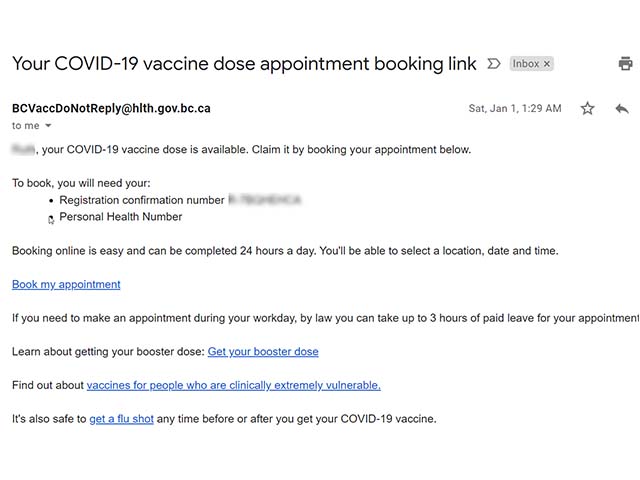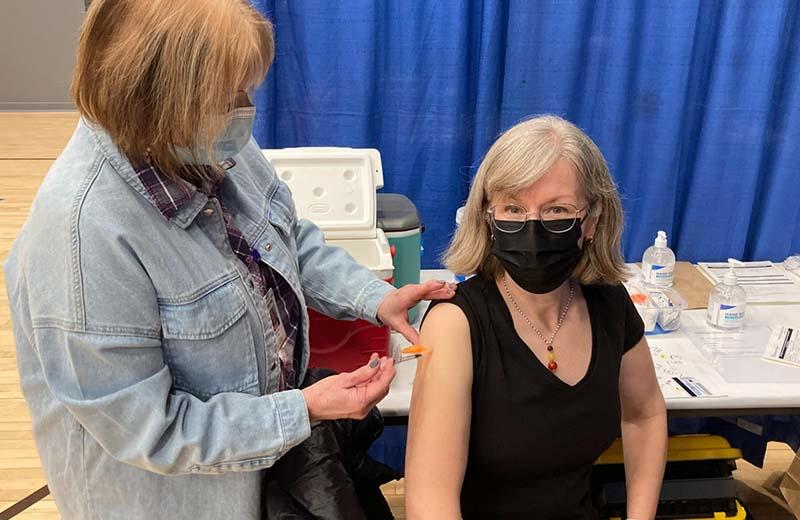Six months had passed since my second dose of COVID-19 vaccine – time for my booster! As you probably know, COVID-19 vaccines get less effective over time. But I knew the booster would bring my COVID-19 immunity back to the strength I had after I got my second dose – or even higher.
Right on schedule, the provincial vaccine system sent me a text and email inviting me to book. Booking online was easy, and I got a prompt confirmation by text (plus a handy reminder the day before the appointment).

There were two reasons I was especially motivated to get the booster.
First, a friend who’s a nurse and who’s been more than careful with masking, handwashing, sanitizing, and distancing, came down with COVID-19 – ironically, the week before she was supposed to get her booster. She’s had a particularly bad case: 11 days of high fevers, two visits to emergency, and now she’s on home oxygen and worried about long-term effects – a nightmare!
Second, one of my sisters and her partner (he’s a doctor) gave me some timely reminders of why we’re doing this. They live in the Gulf Islands, but what they had to say applies to everyone. They reminded me that the reason we should do our part to slow the spread – including getting our boosters – is to help prevent our health care system from becoming overwhelmed:
- If all the ICU beds are filled with COVID-19 patients, what happens when you get in a car accident?
- If all the doctors and nurses are treating COVID-19 patients, then what other important treatments might be postponed?
- Plus, hospital staff can become unavailable due to burnout from treating massive numbers of COVID-19 patients, or because they get the illness themselves, or if they’re isolating – and if there are not enough staff members available, then treatments and procedures may become limited.
In other words, it’s not just about you and your own immunity – we need to look at the big picture and remember that vaccines and boosters can help keep the health care system functioning as normally as possible for everyone in all those vital, non-COVID ways.
So – back to my booster! At the Prince George Civic Centre, it was a smooth, pleasant, and seamless process. Everyone there was very welcoming, and highly expert at their jobs. You check in, you’re asked about COVID-19 symptoms, and then you wait a few minutes for your shot. Thanks to the expertise of nurse Esther Martens, the injection was almost completely painless.
“The majority that we’re doing now are boosters,” said Esther, who works two or three shifts a week at the vaccine clinic, in addition to shifts at the University Hospital of Northern BC in internal medicine, the family medicine unit, short stay, and adult detox.
“There’s some relaxation on the part of those that were unvaccinated,” she says, referring to the increased confidence in vaccines that she’s noticing. “I see them now coming in for their first and second doses – it’s great to see.”
In the days after my vaccine, my arm was a little bit sore, and I felt a bit tired one day, but that’s a small price to pay for protection against this nasty virus -- and even more importantly, to help protect our health care system.
As soon as you’re eligible (six months after Dose 2), please book your booster! (If you’re already registered, you’ll get a text or email when it’s your turn to book.)
For more information on the Omicron variant and the importance of getting your booster, check out “Omicron Wave COVID-19”, a presentation by Northern Health’s Medical Health Officer Dr. Corneil.














Comments